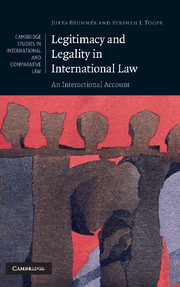1 - An interactional theory of international legal obligation
Published online by Cambridge University Press: 05 July 2013
Summary
If we could come to accept what may be called broadly an interactional view of law, many things would become clear that are now obscured by the prevailing conception of law as a one-way projection of authority.
Introduction
Our goal in this chapter is to set out the conceptual framework of interactional international law. To set the stage, we provide an account of Lon Fuller’s legal theory. We then turn to international law, and articulate a novel approach to legal obligation that helps to distinguish between social and legal norms, a task that Fuller himself did not wish to undertake. In international society we believe that this distinction is relevant and important because of the weak rule of law tradition that Fuller bemoaned. It also helps to address the common question of international relations (IR) thinkers, what value does ‘law’ add? Although our approach challenges conventional wisdom about the operation of international law, it addresses some of international law’s fundamental problems, such as social and political diversity, sources of law and legitimacy.
Fuller’s legal theory
Lon Fuller inspires us because he cared deeply about two key ideas: the generation of social norms through interaction and the sense of responsibility that arises only from the human ability to reason with norms. On the first idea, one could adopt constructivist terms from IR theory to explain that Fuller believed in the mutuality of agency and social structure. To understand how law works, we need to pay attention both to autonomous actors and to the institutions through which they interact. This dual focus highlights that Fuller’s commitment to ‘autonomy’ is best understood in relational terms – as human interaction in social institutions – a constructivist recasting that allows for social and political diversity. Analysing law in this way cuts to the heart of the greatest challenge facing international law: to construct normative institutions while admitting and upholding the diversity of peoples in international society. Fuller explained law, and the rule of law, in a manner that did not require fundamental shared commitments to a single political morality, nor the existence of centralized political authority.
- Type
- Chapter
- Information
- Legitimacy and Legality in International LawAn Interactional Account, pp. 20 - 55Publisher: Cambridge University PressPrint publication year: 2010



